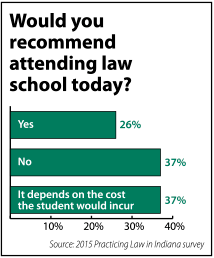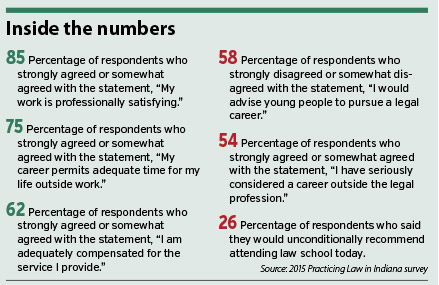Subscriber Benefit
As a subscriber you can listen to articles at work, in the car, or while you work out. Subscribe NowLife’s not bad being a lawyer. Work is satisfying, there’s time for life outside work, and the pay is good. But I wouldn’t recommend it.
Those contradictions in lawyers’ prevailing attitudes were revealed in Indiana Lawyer's Practicing Law in Indiana survey.
“The data we’re getting back from the sample is we see real ambivalence from the practicing bar whether they want to recommend people follow in their footsteps,” Indiana University Maurer School of Law professor William Henderson said at a panel discussion unveiling the survey results.
At least three-quarters of survey respondents agreed their work is professionally satisfying and that their jobs permit adequate time for life outside work, markers that Henderson said are counter to conventional wisdom. Likewise, more than three in five said they were adequately compensated.
 Nevertheless, barely one-quarter of survey respondents said they would unconditionally recommend attending law school today.
Nevertheless, barely one-quarter of survey respondents said they would unconditionally recommend attending law school today.
Thirty-seven percent of survey respondents said they would not recommend people attend law school regardless of cost. An equal 37 percent said whether they would encourage someone to go to law school is dependent on the cost the student would incur.
IU Maurer Dean Austen Parrish was startled that 37 percent of lawyers would discourage law school regardless of cost in light of high levels of professional satisfaction reflected in the survey results. “The attacks on legal education are coming from within, and I find that troubling,” he said.
American Bar Association Deputy Executive Director Jim Dimos noted the dissonance between satisfaction lawyers reported and their sometimes gloomy outlook for the future of law. “Our profession is really under scrutiny at a lot of different levels,” he said.
From bloggers to critical coverage of the profession in the New York Times, he said, a persistent negative narrative has been reinforced, even though the Indiana survey revealed wide majorities of satisfaction on most quality-of-life issues.
“What is happening is we are starting to get into our own echo chamber,” Dimos said. “We may be creating a sense of unhappiness that disconnects from the data.”
Henderson said age of survey respondents proved to be the single largest factor dividing attitudes on various levels of satisfaction, more so than practice setting, geography or gender. For example, lawyers with less than 10 years experience were least likely to say they are adequately compensated, their work is professionally satisfying or to recommend pursuing a legal career. Young lawyers also are likeliest to say they’ve seriously considered a career change.
But young lawyers are also those facing the greatest debt burden after law school.
 Pritchett
Pritchett“It is so expensive,” Mike Pritchett said of pursuing a legal career. Licensed in 2005, he works in insurance defense with State Farm Litigation Counsel. He had scholarship assistance, but still carries a little more than $50,000 in student loan debt.
“I’ve been paying the last 10 years, and I’ve got 20 more to go yet, and it’s tough because you’re trying to raise a family in the meantime,” Pritchett said. He and his wife, Janet, have four children between the ages of 7 and 13.
The ambivalence Henderson noted in the broader survey results is exemplified by Pritchett’s views. Pritchett said anyone considering law school needs to think hard about “how much it’s really going to cost and how long it’s really going to take” to pay back loans.
 By the same token, Pritchett said he’s happy with his professional life. “It certainly has all the rewards of a great job, it’s something different every day, and that works for my personality.
By the same token, Pritchett said he’s happy with his professional life. “It certainly has all the rewards of a great job, it’s something different every day, and that works for my personality.
“I have a very rewarding job and I enjoy coming to work every day, and I know not everybody has that. I’m appreciative of it, for sure,” he said.
Some recent law school grads contacted for this story who declined to be identified said they carried student loan debt up to $250,000. Henderson said the survey data show students with time left to pay off loans were among those most likely to say they regretted their decision to become a lawyer.
That’s not the case for Joseph Wooldridge, who came into the legal profession during one of the most economically trying periods of recent years. He began practicing in 2008 at the Wolf Law Firm LLC in Greenfield, and he’s paid off his debts from school.
The economic downturn, though, was particularly tough on the legal profession. “People who were getting out of law school at that time seemed to have it tougher, too,” Wooldridge said.
“Many of my fellow classmates struggled to find jobs,” he said. “It takes a unique person to be successful in this industry. If you’re a successful attorney, you can be successful in almost anything.”
Wooldridge understands the seeming divide between lawyers who say they’re happy with their professional lives but are cautious to recommend it. Because many law school grads never practice, or they ply their skills in JD-preferred jobs, “essentially, there’s only a 50 percent chance of being an attorney.”
As the father of 8-month-old twin girls, he said he’s grateful to work in a profession that 83 percent of survey respondents said provides flexible work arrangements.
 Vrana
VranaVeteran Columbus Social Security disability attorney Tim Vrana said he’s faced tough decisions several times in his life about the direction of his career. “I’ve always chosen to be happier, and I love what I do,” he said.
Yet at 63, he confesses sometimes he wonders if that might have been a mistake. He could have made more money, maybe have his house paid off and be debt-free now, had he chosen differently.
“I’ve made a living, but I’m not so sure I’d say it’s commensurate with the amount of time I’ve spent on it,” he said. For the past 11 years, he’s been a solo practitioner after 22 years with a Columbus firm.
“In terms of telling a young person this is a good field to go into, as satisfying as it’s been for me, it’s also been difficult to make a living at it,” he said. “If you go into it expecting to make a lot of money, some of us do, but a lot of us don’t.”
Vrana said people considering a career in law need to realize high-paying jobs at large law firms are not the norm. But there’s also something of worth serving in what he considers a helping profession.
“There’s no lack of satisfaction in what we do,” he said. “Every file I pick up, I’m helping somebody or trying to help somebody. That’s a tremendously wonderful feeling.”•
Please enable JavaScript to view this content.
